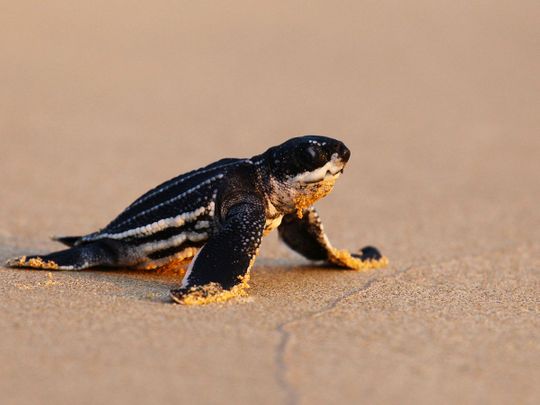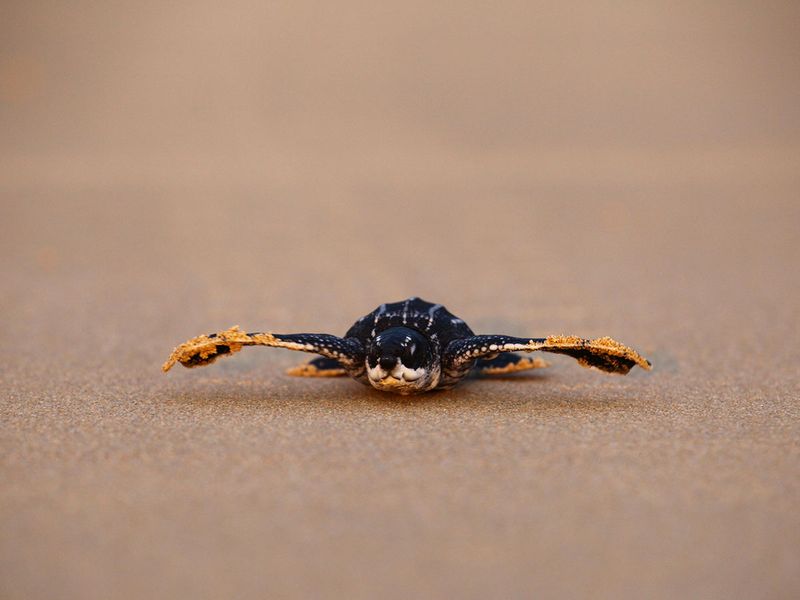
Dubai: As the world battles the coronavirus crisis that has affected millions all over the world, on Earth Day, April 22, there is still something to celebrate.
In Thailand, Leatherback sea turtles have made the largest number of turtle nests in almost two decades, and this happy news is going viral online.
While human beings stay home to avoid the spread of coronavirus, Nature is taking her time to recuperate and repair the damage done over the years.
Turtles thrive during lockdown
According to an article by UK-based newspaper, The Guardian, there was a surge in turtle nests after beaches were left empty of tourists.
The report adds that authorities managed to find “11 turtle nests” since last November, and it is the highest number of nests found in two decades.
Thailand has 2,811 confirmed cases, 2,108 recoveries and 48 deaths from coronavirus as per April 22. Many beach and island resorts in Thailand have been on a strict lockdown since the virus outbreak.

According to an article by US-based television channel, CNN, which quotes a supervisor at the MaiKhao Marine Turtle Foundation, there has been an increase in other marine species like “dolphins and dugong” that live in the region, "as stated in a government survey". The population of hermit crabs has also gone up.
Sea turtles are also thriving on beaches in Florida, US, as lockdowns around the world are keeping people at home.
The news was buzzing on social media and users were thrilled at the positive side of the impact of COVID-19.
Online reactions …
Tweep @susantananda3 posted: “11 leatherback turtle nests for the first time in 2 decades in deserted Thai beaches. The tourism has collapsed, but freed up the beaches for [wild life]. Leatherback is the largest sea turtles, endangered in Thailand….”
@calicobayfarm posted: “Imagine if we simply closed all beaches worldwide during hatching season. We would have more abundance in our wildlife. Seems like a minor inconvenience for such a great gain. #Saltlife #esturainelover”
@burpeesRfun posted: “Wish it was always like this...we humans tend to ruin things.”
And Tweep @Greggory_Morris posted: “Where I live, I am hearing seals out on the beaches for the first time ever.”
Leatherback turtles are the world’s largest sea turtles, and are endangered in Thailand.
According to to the World Wildlife Fund, they are considered a “vulnerable species”. They are named after their shell, which is “leather-like rather than hard, like other turtles”. Plastic found in oceans is a big threat to marine life and has a devastating impact on the sea turtle population.
Around the world, animals like ducks, deer, badgers, peacocks and more are wandering out onto the streets and the pictures being shared on social media look like scenes from animated movies.
Tweep @RupertMyers uploaded a video where deer are seen walking the streets of what looks like Paris.
And tweep @HelenYates52 commented: Isn't it amazing how animals know that it's safe to wander, this is happening the world over, this coronavirus is keeping a far more dangerous virus indoors … the planet is healing, that should tell us all something.”
Earth Day 2020
Earth Day is celebrated annually and this year marks the 50th anniversary of the occasion. It was launched in 1970. According to their official website www.earthday.org, this year’s theme is climate change and how it is a threat to human life.
Google celebrated Earth Day with an interactive Google doodle, which honours bees. The doodle explains the process of pollination and the importance of bees in the ecosystem.
_resources1_16a3106f471_original-ratio.jpg)
A decline in bees...
Honeybees are vital for survival as they help pollinate flowers and help plants grow.
However, the population of honeybees is decreasing significantly and this is a cause for concern. The main reason? Climate chage. According to US-based television network National Geographic, change in temperatures, could have "dire consequences for ecosystems and agriculture". Those areas that have recorded high temperatures see less bees.
But in addition to climate change, the increase in use of pesticides and chemicals during agriculture is another reason for the sharp decline of honeybees. They are toxic and destroy bee habitats. Bees are essential for the functioning of the ecosystem and need to be protected.
According to the National Geographic's website www.natgeokids.com, here are some interesting facts about honeybees:
- Honeybees help other plants grow through pollination.
- Honeybees live in “hives or colonies” and the members are divided into "Queen, Workers and Drones".
- Bees are very fast and fly at a speed of “25km per hour and beat their wings 200 times per second”.
- The average worker bee lives for just five to six weeks and will produce around “a twelfth of a teaspoon of honey”.
If you have any pictures of nature or wildlife in the UAE, please email them to us at readers@gulfnews.com.








